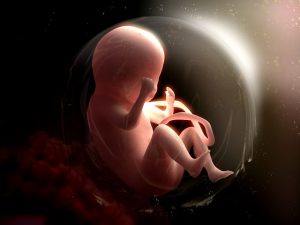
Maternal stress could leave epigenetic marks in the placenta’s genes associated with cortisol, a hormone necessary for fetal development. This would affect the baby’s development at very early stages, as outlined in an article published in the journal European Neuropsychopharmacology.
The study suggests that a mother’s emotional well-being during pregnancy is not only important for her, but could also affect her baby’s future health. The study is led by Lourdes Fañanás, a professor at the University of Barcelona’s Faculty of Biology and Institute of Biomedicine (IBUB).
Maternal Stress and its Possible Consequences
The placenta is an important organ during pregnancy, as it not only supplies the fetus with oxygen and nutrients, but also reacts to factors such as maternal stress and helps the fetus to adapt to its environment. However, the mechanisms by which the placenta adapts to these stress factors and how it influences fetal development are still largely unknown. The research team observed that maternal stress can leave epigenetic marks on certain placental genes. These marks do not alter the genetic structure, but they do alter its function. The study identified epigenetic changes in genes related to the regulation of cortisol, an important hormone in the body’s response to stress.
Support for Women from the Earliest Stages of Pregnancy
This pilot study, funded by a CIBERSAM intramural project, involved 45 healthy primiparous women. During pregnancy, their cortisol levels and depressive symptoms were measured and after delivery, the placentas were analyzed. At seven weeks, the babies’ neurological development was assessed using a specialized test (Brazeltons NBAS).
The research team used an advanced sequencing technique that makes it possible to study epigenetic changes in large DNA areas, thus providing a very detailed insight into the placenta’s response to maternal stress. This method identified changes in key genes involved in cortisol regulation, such as HSD11B2, NR3C1 and FKBP5. The results suggest that maternal stress – especially in early pregnancy – can cause changes in these genes that could affect fetal development and the baby’s future health. Águeda Castro, first author of the study and CIBERSAM researcher at the University of Barcelona, emphasizes that “this study highlights the importance of maternal mental health from the beginning of pregnancy, since stress could have a biological impact on the baby’s development through epigenetic mechanisms that we are only beginning to understand.”
IBUB selected this article as the best scientific publication in November 2024 for its innovative approach to prenatal and mental health. Although it is a pilot study, the results pave the way for future research and possible interventions to support pregnant women in vulnerable situations from the very beginning. While these groundbreaking findings need to be replicated in larger studies, they underscore the importance of psychological care and emotional support during pregnancy, not only for the mother’s well-being but also for the baby’s long-term health.



